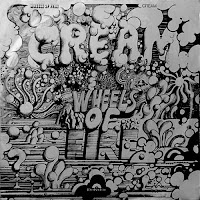1968
Cream "Wheels of Fire"
 Another first in what was to become a staple: one record
made in the studio, the other 'recorded live', and the two records also
released as two separate lps (which became a pointless habit when The Who's
"Tommy" (a continuous story) was released as Part One and Part Two). Musicians
now wanted to show off their proficiency in both the studio and playing in
front of an audience. The former enabled them to be ambitious and experiment
with recording techniques and additional instrumentation. The latter meant that
they had to be able to play without the aid of studio gimcrackery.
Another first in what was to become a staple: one record
made in the studio, the other 'recorded live', and the two records also
released as two separate lps (which became a pointless habit when The Who's
"Tommy" (a continuous story) was released as Part One and Part Two). Musicians
now wanted to show off their proficiency in both the studio and playing in
front of an audience. The former enabled them to be ambitious and experiment
with recording techniques and additional instrumentation. The latter meant that
they had to be able to play without the aid of studio gimcrackery.
Cream were a group that prided themselves on being able
to cut it live, having spent a number of years doing just that in small clubs
playing jazz and blues. They also wanted to make some of the new music that was
floating around London. Not psychedelic but not traditional either nor
straightforward pop. A song like "Passing the Time" has a number of
different sections and time shifts. A prog rock precursor in miniature. Same
with "Pressed Rat and Warthog".
The original trio are augmented quite a bit on the studio
side by Felix Pappalardi on several instruments such as viola and trumpet,
along with Jack Bruce chucking in a liberal helping of cello all over the record.
I like the extra guitars (at least three lead guitars all playing at once) that
are poured over "Politician".
In another move that was soon to become a trope,
"Wheels of Fire" sought to provide showcases for the individual
talents of each member of the group. So, the studio record has separate
compositions by Jack Bruce and Ginger Baker along with two blues numbers chosen
by Eric Clapton, while the live record contains two songs that feature Clapton
along with a Jack Bruce harmonica sortie and a Ginger Baker drum solo. It is
almost as if groups forget that what gives them strength is collective
creativity, and they imagine themselves to be solo talents which many of them
are not.
Funnily enough, although Cream get credited as being one
of the first album acts and as being a deep listening experience for serious
rock fans, I prefer to think of them as being a singles band. All of their best
material was released on singles in one form or another and the stuff that is
left on the albums is actually rather mundane. I think one of the main reasons
that "Disraeli Gears" and "Wheels of Fire" get rated as
great lps is on account of their stunning Martin Sharp artwork. To add to the
controversy, let me say that I also think the material that Bruce, Baker and
Clapton recorded separately either immediately after or shortly after Cream
broke up is more diverse, interesting and worthy than that of their parent
group.
Why then do people rate Cream? I think it is because on
songs like "White Room" and "Crossroads" they make a great
noise. Few things are better than hearing Baker and Bruce have a musical
argument, each trying to outdo the other, while Clapton stays out of it for the
most part. "Crossroads" is, of course, Clapton's masterpiece. A
simple song which is ridiculously hard to play the way he does. When they take
off during the solos you feel they could play for ever and it is genuine group
interplay rather than selfish showing off. Their version of
"Spoonful" makes much the same point only at much greater length.
Most critics complain that the fault with "Wheels of
Fire" is that it does not contain enough good songs. That may be true but
my complaint is that it does not contain enough excessive wankery. Almost every
track is under 5 minutes long with only "Spoonful" and
"Toad" exceeding 15 minutes. I quite like Cream when they go on and
on and on and would have settled for more of this. I think their best lp is
"Cream on Top" which lifts "Spoonful" and "Toad"
from "Wheels of Fire" and puts them with a live version of
"Politician" from one of the "Live Cream" lps plus the
lovely little "Badge" with its dinky George Harrison riff in the
middle. "Wheels of Fire" is too polite. It should consist of only four
songs, one per side and 20 minutes long. That's what I want. It ultimately
fails because this most excessive of rock groups does not get excessive enough.
No comments:
Post a Comment